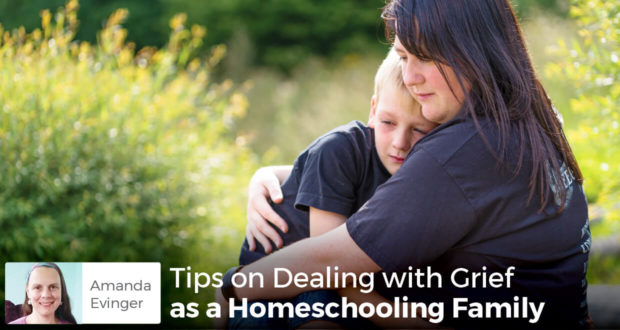Summary
The death of a loved one can be overwhelming. Amanda Evinger shares 5 practical and spiritual ways to cope with grief while taking care of your family.It may seem a little odd to find an article which deals with the topics of grief and homeschooling — all on the same page.
As the Christmas Season is known to be a most difficult time for those who are grieving, I thought that posting an article about how to work through grief as a homeschooling family would be appropriate.
The truth is, almost every homeschooling family will have to work through a significant time of grief at some point, or has had to in the past — all while having to keep up with the blessed demands of homeschooling. The death of a father or mother, an unborn baby, infant, or older child, or a spouse is a reality we will face from time to time.
Because we are homeschooling families, we will need to find ways not only to deal with our grief as we are homeschooling, but possibly even incorporate important life lessons learned from the grieving process into the spiritual and academic education we are giving to our children.
First, I will mention that I am not a professional expert on this subject, but I do have the light of experience, and a true desire to help others who are grieving.
When my husband and I married, he gave me a wedding ring that had 10 stones on it — one for each child we dreamed of having, with all due respect to God’s will. After we were blessed with two healthy children, I experienced a very traumatic miscarriage at nearly four months along, in 2012.
Six weeks after the miscarriage, I became pregnant again, after praying to have twins. Sure enough, merely six weeks into the pregnancy I felt sure I did indeed have twins — and I did. The pregnancy was extremely uncomfortable and even painful, and I was almost unable to walk or stand.
Instinctively, I knew something was wrong, although everything had looked normal at my prenatal appointments and on an ultrasound. After a grueling labor which ended with an emergency c-section, we found that my twins were conjoined, sharing one body and having two perfectly formed heads.
They died in my husband’s arms after he baptized them, soon after they were born. Over the past three years, Our Lord the Good Shepherd has carried me through a grieving process, and I am so grateful for His grace.
With time, He showed me several ways to cope with grief as I kept up my duties in caring for my family. Here are five things I learned that might help you:
1. Give yourself plenty of time.
Everyone’s grieving journey is totally different. Grief counselors often say to give yourself a year after the death of a significant family member before you expect to be feeling or acting pretty normal when it comes to things like your work capacity, your sleeping and eating habits, and even your prayer life.
Do not feel guilty if it really does take a year or longer before the school day is productive and joyful again. For us, it worked to get back into school soon after we lost the twins.
It kept my mind busy, and I was able to focus on the subjects I really enjoyed, like reading great books to the kids while cuddling with them.
2. Take advantage of all that grieving has to teach your family.
Embrace it, in a sense. All Saints Day and All Souls Day will never be the same, and the appreciation for the eternal truths of our Holy Faith can be born anew in the hearts of those who mourn. In a way, Catholicism can really come alive and feel so tangible to your children when they experience grieving as a family.
Their Religion texts don’t have to be “dead books” any longer — they can be something to turn to when answers to life’s sorrows are desperately needed. Allow your children to see you pray when you are on the verge of tears, and experience God’s consolation.
Together, read Scripture passages or quotes from other great Catholic sources that help you to deal with grief as a family. For example, in 2015, Pope Francis gave this beautiful message to grieving families:
Jesus has compassion on those who mourn, as today’s Scripture reading reminds us, because the death of a loved one is never without pain for families; this is especially true of parents who lose a child. Jesus’ presence with the widow at Na’in assures us that he is with us in our darkest moments and that he is with us in our loss and mourning. Through faith in him, in his Resurrection and his abiding presence, we can face our loss, “the sting of death”, as Saint Paul calls it, make sense of it, and have confidence that death does not have the last word.
3. Be thankful you are homeschooling.
After losing a loved one, the schedule of a homeschooling parent can prove to be very helpful. It’s busy, which provides healthy distraction. It is also flexible, allowing grieving members of your family some space and time to deal with bouts of sadness, that often come over a person at less than ideal moments.
And homeschooling provides a wonderful way for a family to spend time together and bond after such a traumatic event. The homeschooling day also makes it possible to attend daily Mass sometimes or to receive the Sacrament of Confession, which can do wonders to heal a broken heart.
4. Be more social than usual, if it helps.
When you start feeling up to it, going to Christmas parties or getting more involved in your homeschool group, sports, 4-H, or other learning activities can help to brighten your family’s days of healing.
5. Rely totally on God’s grace and the help of His people.
As homeschoolers, many of us are blessed with knowing many caring people who share our values and beliefs. Don’t be afraid to rely on them for help, or reach out to a friend when all looks dark. A lot of times, people are much more understanding than you may think they are. On the flip side, don’t take it personally if people don’t respond the way you hoped they would.
If they have never experienced the traumatic loss of a loved one, they simply may not comprehend how difficult it is, or they may not know what to say. After I lost the twins, I received a lovely sympathy card from a friend that touched me. It simply said, “I just don’t know what to say.” Her honesty lifted me up.
Last week, this same friend lost her newborn baby, and I have felt like saying the same words to her. An old friend of mine, a Catholic missionary doctor, wrote me a letter after our twins died in which he said, “After so many years of doctoring I know there are times when someone just has to say: ‘There are no words.’” Don’t feel badly if people seem not to care or respond. Maybe they are praying for you more than you think.
In all things, cling to the Most Sacred Heart of Jesus, who bears all the mercy the world has ever known.
A Prayer to be Said When Grieving
Dearest Jesus, who wept at the death of your friend
and taught that they who mourn shall be comforted,
grant us the comfort of your presence in our loss.
Send Your Holy Spirit to direct us
lest we make hasty or foolish decisions.
Send Your Spirit to give us courage
lest through fear we recoil from living.
Send Your Spirit to bring us your peace
lest bitterness, false guilt, or regret take root in our hearts.
The Lord has given.
The Lord has taken away.
Blessed be the Name of the Lord.
Amen.O sweet Mother Mary,
who knew the sadness of mourning those your heart loved most,
Jesus, your Son,
and Joseph, your devoted spouse,
pray for us in our time of loss.
Amen.

 Seton Magazine Catholic Homeschool Articles, Advice & Resources
Seton Magazine Catholic Homeschool Articles, Advice & Resources

